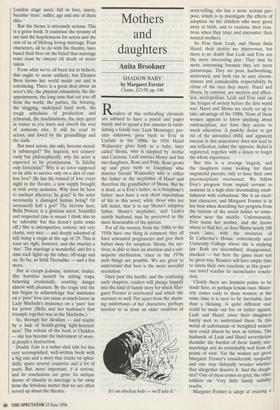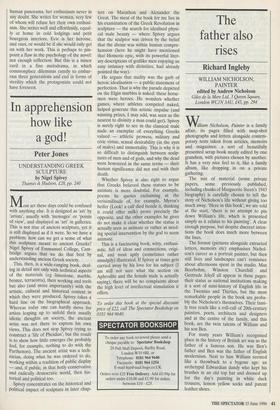Mothers and daughters
Anita Brookner
SHADOW BABY by Margaret Forster Chatto, £15.99, pp. 346 Readers of this enthralling chronicle are advised to have a pencil and paper handy and to spend a few minutes in estab- lishing a family tree. Leah Messenger, par- ents unknown, gives birth to Evie in Carlisle in the 1880s. In 1956 Hazel Walmesley gives birth to a baby, later called Shona, who is adopted by Archie and Catriona. Leah marries Henry and has two daughters, Rose and Polly. Rose grows up and gives birth to Josephine who marries Gerald Walmesley who is either the father or the stepfather of Hazel and therefore the grandfather of Shona. But he is dead, as is Evie's father, as is Josephine's father: men have a very short expectation of life in this novel, while those who are left intact, that is to say Shona's adoptive father, Shona's stepfather, and Leah's saintly husband, may be perceived as the more honourable of the species.
For all the women, from the 1880s to the 1950s have one thing in common: they all have unwanted pregnancies and give their babies away for adoption. Shona, the sur- vivor, is able to have an abortion and a sub- sequent sterilisation, since in the 1970s such things are possible. We are given to understand that hers is the more merciful resolution.
Once past this hurdle, and the confusing early chapters, readers will plunge happily into the kind of family story for which Mar- garet Forster is celebrated and which she executes so well. For apart from the alarm- ing misfortunes of her characters, perhaps familiar to us from an older tradition of
It's an absolute hole — we'll take it.'
story-telling, she has a more serious pur- pose, which is to investigate the effects of adoption on the children who were given away at birth, and to examine their reac- tions when they trace and encounter their natural mothers.
So Evie finds Leah, and Shona finds Hazel; their stories are interwoven, but there is no doubt that Leah and Evie are the more interesting pair. They may be more interesting because they are more picturesque. They are poor, hardworking, mistreated, and both rise to easy circum- stances and considerable respectability by virtue of the men they marry. Hazel and Shona, by contrast, are modern and affect- less, metropolitan. Leah and Evie exist on the fringes of society before the first world war; Hazel and Shona are nicely set up to take advantage of the 1980s. None of these women appears to know anything about contraception, nor have they access to much education. A panicky desire to get rid of the unwanted child, and apparent success in this manoeuvre does not lead to any reflection, rather the opposite. Relief is registered, together with a desire to forget the whole experience.
But this is a revenge tragedy, and the daughters come looking for their ungrateful parents, only to have their own preconceptions overturned. We follow Evie's progress from unpaid servant to assistant in a high-class dressmaking estab- lishment with enthusiasm. She is an excel- lent character, and Margaret Forster is at her best when describing her progress from the bottom of the social ladder to some- where near the middle. Unfortunately, Evie wants her mother, and she knows where to find her, as does Shona nearly 100 years later, with the resources of St Catherine's House, conveniently near University College where she is studying law. Both are discomfited, disappointed, shocked — but here the game must not be given way. Readers will have ample time to assess their own reactions, as this gener- ous novel reaches its inconclusive conclu- sion.
Clearly there are feminist points to be made here, or perhaps female ones. Mater- nity comes early to these women; at the same time it is seen to be inevitable, less than a blessing. A quite different case could be made out for, or rather against, Leah and Hazel, since their daughters barely seek to understand them. In this world of unfortunate or benighted women men could almost be seen as victims. The husbands of Leah and Hazel nevertheless shoulder the burden of these family mis- matchings and do remarkably well from all points of view. Yet the women are given Margaret Forster's considerable sympathy and one may disloyally wonder whether they altogether deserve it. And the daugh- ters? One of them comes to grief, the other soldiers on. Very little family stability results.
Margaret Forster is adept at creating a human panorama, her enthusiasm never in any doubt. She writes for women, very few of whom will refuse her their own enthusi- asm. She writes well and effortlessly, equal- ly at home in cold lodgings and petit bourgeois interiors. Evie is her heroine, and ours, or would be if she would only get on with her work. This is perhaps to pin- point a flaw in the psychology of the novel: not enough reflection. But this is a minor cavil in a fine melodrama, in which commonplace dilemmas ramify to embar- rass three generations and end in forms of sterility which the protagonists could not have foreseen.



































































 Previous page
Previous page